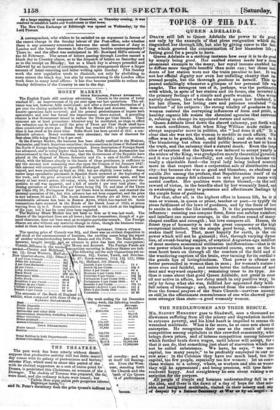QUEEN ADELAIDE.
DEATFI still left to Queen Adelaide the power to do good, not only by the example of that pions resignation which di.: tinguished her through life, but also by giving cause to the feel. ing which greeted the consummation of her blameless life; a feeling good for a people to have.
Queen Adelaide is a striking instance how easy it is to do good by simply being good. Iler exalted station made her a more prominent example to the many, her royal income enabled lie! to diffuse more tangible benefits than most can; but those inei. dents of her station were not the traits peculiar to her. It was not her official dignity nor even her unfailing charity that h. pressed people, but the thorough goodness in herself. This ap. peared unfailingly whenever a glimpse of her personal life was caught. The strongest test of it, perhaps, was the pertinacity with which, in spite of her station and its forms, she reverted to the primary feelings of a simple and gentle woman. One writer naively declares, that when she attended upon her husband, in his last illness, her loving care and patience emulated "the humblest" of his subjects : the strong vitality of goodness in the woman resisted the corrupting influences of form and pride, as healthy organic life resists the chemical agencies that surround it, refusing to change its appointed nature and action.
Queen Adelaide lived down the absurd calumny, put forth with so much confidence, that when King William made rather an abrupt unpopular move in politics, she "had done it all." It clear that she was not the woman to meddle in such affairs. Her office was to be gentle kind, and faithful; and she stuck to it. The blundering but Often candid public 'learned at last to know the truth, and the calumny died a natural death. Even the large slice of taxation that the Queen was induced to accept yearly as the widow of the King, was grudged on merely theoretical grounds and it was yielded up cheerfully, not only because it became via. tually a charitable fund—the royal lady being indeed scarcely more in that respect than a corporation sole of distributive cha. rity—but because she Was so good and blameless, so obedient an axed& Dei among the profane, that Republicanism itself of the most Spartan stamp felt ashamed to mix her gentle name with sordid conflict. Her qualities were thrice blessed,—in the self. reward of virtue, in the benefits shed by her womanly hand, and in awakening so many to generous and affectionate feelings by the simple force of goodness.
For that, after all, is the highest office in human life, be it i man or woman, in queen or priest, teacher or poet—to typify th pious fulfilment of the laws of goodness, and by the force of lov to excite in others the like instinct. It is the paramount human influence : cunning can conquer force, force can subdue numbers and intellect can master courage, in the endless round of many shaped conflict and strength ; but love conquers all. Hence„ tin fittest type of humanity is not the great conqueror or the high exceptional intellect, but the simple good being, which, loving, makes itself loved. That, most happily for earth, is the one power which will not be gainsaid; that, through varying dynas ties, of sword-bearing empire, of sceptical Augustan-age intellect of most modern economical utilitarian indifferentism—that is the one power which keeps on its unwearied course, even as the he man heart beats on through all the combats of the field and al the wandering caprices of the brain, ever turning for its cordial Is the gentle lips of lovingkindness. That power is oftener ant better personified in woman than in man; for woman's nature more even and faithful, and resists better the influences of acci dent and wayward capacity; remaining truer to its type. Ant thus it came about that good Queen Adelaide, not great in coun cil nor active in affairs, nor doing much in any positive way, bn only by being what she was, fulfilled her appointed duty with full return of blessings ; and, removed from the scene—remove' from the formal prayers of the State Church—survives amongs us still:in the affectionate remembrance of one who showed good ness stronger than state—a good womanly woman.
























 Previous page
Previous page